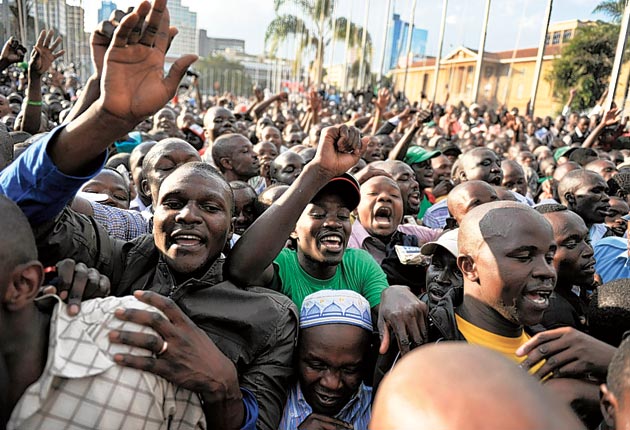Kenya rejoices at the 'birth of a new republic'

Your support helps us to tell the story
From reproductive rights to climate change to Big Tech, The Independent is on the ground when the story is developing. Whether it's investigating the financials of Elon Musk's pro-Trump PAC or producing our latest documentary, 'The A Word', which shines a light on the American women fighting for reproductive rights, we know how important it is to parse out the facts from the messaging.
At such a critical moment in US history, we need reporters on the ground. Your donation allows us to keep sending journalists to speak to both sides of the story.
The Independent is trusted by Americans across the entire political spectrum. And unlike many other quality news outlets, we choose not to lock Americans out of our reporting and analysis with paywalls. We believe quality journalism should be available to everyone, paid for by those who can afford it.
Your support makes all the difference.Kenya was swept by a wave of optimism yesterday unseen since the victory celebrations for Barack Obama's presidential win. That triumph was down to a Kenyan descendant, but this win was entirely homegrown as the final results showed an overwhelming majority of the country had backed a new constitution.
Supporters of the draft document which aims to devolve power from the presidency, address land issues and overhaul the corrupt judiciary hailed the vote as "the birth of the second republic".
"Just taking the temperature and the pulse of the people this morning, everyone feels as optimistic as the day President Obama was voted in," said Kenyan financial analyst, Aly Khan Sutchu. "It's a similar scenario with smiles on everyone's faces." The optimism was reflected in the markets where the Kenyan shilling made gains against sterling and the US dollar, and the Nairobi stock exchange is expected to continue its recent rally.
The regional powerhouse and the biggest diversified economy in sub-Saharan Africa behind South Africa, Kenya's stability matters. The post-election violence two years ago had immediate consequences for its economically fragile neighbours in east Africa and yesterday's redrawing of its politics is expected to boost economic prospects in the region.
"Confidence was a key requirement for economic turnaround, and the peaceful passage of the vote should do a lot to underscore that," said Razia Khan, Africa economist at Standard Chartered Bank.
More importantly for a country still haunted by memories of the violent fallout from a flawed election in 2007, the referendum passed without major incident. As the scale of defeat became apparent with two-thirds of voters backing the new constitution, the No camp conceded defeat – a rarity in Kenya's fractious politics. "(The) majority had their way, we had our say," said William Ruto, the leader of the No campaign, and the country's higher education minister.
However, he quickly returned to the offensive trying to argue that more Kenyans had abstained or voted No than had endorsed the draft.
Early results indicated that more than 72 per cent of registered voters had gone to the polls which would make it the strongest turnout for a national vote in Kenya's history.
For millions of Kenyans accustomed to elections as periodic tribal censuses it was also a taste of more substantial politics where issues and ideologies were at stake. "This was a special vote because finally we weren't voting for politicians, we were voting for issues and institutions and the foundations of the problems we keep facing," said Kepha Ngito, a rights campaigner at the Catholic charity Cafod. Mr Ngito, who works in Nairobi's largest slum, Kibera, said people now knew their rights and would demand them.
"The true legacy of the post-election violence is that the politicians would not have joined together to push through such a big piece of reform without it. The people have felt justice at last but we had to go through it the hard way."
Civil society activists called for the public to keep up the pressure on politicians as the draft is implemented. "My main fear is that if we make this precious moment in Kenya's history about politicians," said Ngunjiri Wambugu, a rights campaigner, "we risk losing all these ordinary Kenyans, who stepped out of their comfort zones, at a most crucial part of the process: implementation of the new constitution."
While some parts of the new settlement, like the bill of rights, come into effect immediately others concerning the political system, the courts and land tenure will take time to implement. The draft's opponents – who included many church leaders upset at clauses on abortion and Islamic courts – were already signalling their intention to demand amendments.
The toughest battle is likely to come over land rights. The draft calls for drastic changes to Kenya's legal framework that opponents have warned will lead to a "Pandora's box" of ancestral territory claims.
Join our commenting forum
Join thought-provoking conversations, follow other Independent readers and see their replies
Comments